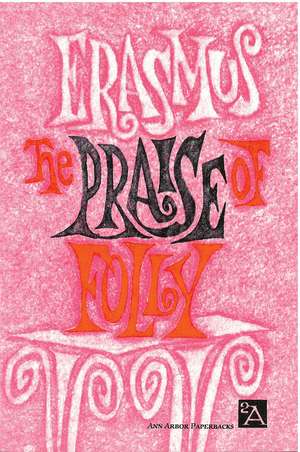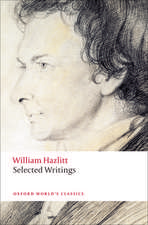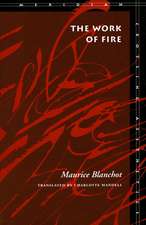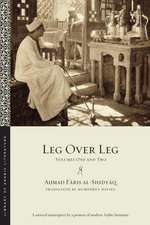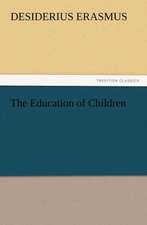Praise of Folly: Ann Arbor Paperbacks
Autor Desiderius Erasmus Traducere de John Wilsonen Limba Engleză Paperback – 15 ian 1958
| Toate formatele și edițiile | Preț | Express |
|---|---|---|
| Paperback (9) | 42.75 lei 3-5 săpt. | |
| CreateSpace Independent Publishing Platform – | 42.75 lei 3-5 săpt. | |
| Penguin Books – 24 noi 1993 | 52.62 lei 26-32 zile | +18.16 lei 7-13 zile |
| Alma Books COMMIS – 11 sep 2013 | 58.75 lei 3-5 săpt. | +14.00 lei 7-13 zile |
| CREATESPACE – | 59.15 lei 3-5 săpt. | |
| Globe Pequot Press – mai 1994 | 87.39 lei 3-5 săpt. | |
| ALPHA EDITION – 30 iun 2024 | 93.19 lei 3-5 săpt. | |
| Lector House – 9 mar 2020 | 58.31 lei 6-8 săpt. | |
| Echo Library – 30 iun 2009 | 66.40 lei 38-44 zile | |
| TREDITION CLASSICS – 31 oct 2011 | 130.35 lei 6-8 săpt. |
Din seria Ann Arbor Paperbacks
-
 Preț: 206.14 lei
Preț: 206.14 lei -
 Preț: 139.32 lei
Preț: 139.32 lei -
 Preț: 162.61 lei
Preț: 162.61 lei -
 Preț: 130.74 lei
Preț: 130.74 lei -
 Preț: 147.42 lei
Preț: 147.42 lei -
 Preț: 156.20 lei
Preț: 156.20 lei -
 Preț: 116.28 lei
Preț: 116.28 lei -
 Preț: 198.45 lei
Preț: 198.45 lei -
 Preț: 222.42 lei
Preț: 222.42 lei -
 Preț: 297.81 lei
Preț: 297.81 lei -
 Preț: 279.68 lei
Preț: 279.68 lei -
 Preț: 110.88 lei
Preț: 110.88 lei -
 Preț: 117.14 lei
Preț: 117.14 lei -
 Preț: 273.41 lei
Preț: 273.41 lei -
 Preț: 121.54 lei
Preț: 121.54 lei -
 Preț: 207.09 lei
Preț: 207.09 lei -
 Preț: 123.93 lei
Preț: 123.93 lei -
 Preț: 147.92 lei
Preț: 147.92 lei -
 Preț: 305.85 lei
Preț: 305.85 lei -
 Preț: 104.90 lei
Preț: 104.90 lei -
 Preț: 179.35 lei
Preț: 179.35 lei -
 Preț: 148.22 lei
Preț: 148.22 lei -
 Preț: 211.77 lei
Preț: 211.77 lei -
 Preț: 113.83 lei
Preț: 113.83 lei -
 Preț: 116.51 lei
Preț: 116.51 lei - 8%
 Preț: 134.01 lei
Preț: 134.01 lei -
 Preț: 115.55 lei
Preț: 115.55 lei -
 Preț: 273.32 lei
Preț: 273.32 lei -
 Preț: 162.77 lei
Preț: 162.77 lei -
 Preț: 171.89 lei
Preț: 171.89 lei -
 Preț: 156.99 lei
Preț: 156.99 lei -
 Preț: 231.41 lei
Preț: 231.41 lei -
 Preț: 102.29 lei
Preț: 102.29 lei -
 Preț: 200.55 lei
Preț: 200.55 lei
Preț: 129.84 lei
Nou
Puncte Express: 195
Preț estimativ în valută:
24.85€ • 25.84$ • 20.79£
24.85€ • 25.84$ • 20.79£
Carte indisponibilă temporar
Doresc să fiu notificat când acest titlu va fi disponibil:
Se trimite...
Preluare comenzi: 021 569.72.76
Specificații
ISBN-13: 9780472060238
ISBN-10: 0472060236
Pagini: 160
Dimensiuni: 137 x 203 x 15 mm
Greutate: 0.2 kg
Editura: UNIVERSITY OF MICHIGAN PRESS
Colecția University of Michigan Press
Seria Ann Arbor Paperbacks
ISBN-10: 0472060236
Pagini: 160
Dimensiuni: 137 x 203 x 15 mm
Greutate: 0.2 kg
Editura: UNIVERSITY OF MICHIGAN PRESS
Colecția University of Michigan Press
Seria Ann Arbor Paperbacks
Descriere
A satire on the pretensions of Erasmus's contemporaries in the Church and philosophy
Notă biografică
Desiderius
Erasmus,
born
about
1469,
went
to
school
at
Gouda,
Utrecht
and
Deventer.
He
became
the
most
famous
humanist
of
the
Northern
Renaissance.
Erasmus
travelled
widely,
and
his
thought
was
particularly
influential
in
England,
where
he
became
a
close
friend
of
Thomas
More.
He
died
in
Basle
in
1536.
Betty Radice became joint editor of the Penguin Classics in 1964, and translated from the Latin, Greek and Italian. She was an honorary fellow of St Hilda's College, Oxford. She died in 1983.
A.H.T. Levi was Buchanan Professor of French Language and Literature at the University of St Andrews and has published extensively on the Renaissance.
Betty Radice became joint editor of the Penguin Classics in 1964, and translated from the Latin, Greek and Italian. She was an honorary fellow of St Hilda's College, Oxford. She died in 1983.
A.H.T. Levi was Buchanan Professor of French Language and Literature at the University of St Andrews and has published extensively on the Renaissance.
Cuprins
Praise of Folly Preface to the 1993 Edition
Introduction
1. The importance of the Praise of Folly
2. Erasmus, scholastics, humanists and reformers
3. The Praise of Folly, Dorp and the spirituality of Erasmus
Select Bibliography
Praise of Folly
Prefatory Letter
Moriae Encomium, that is, the Praise of Folly
Letter to Maarten Van Dorp, 1515
Index
Introduction
1. The importance of the Praise of Folly
2. Erasmus, scholastics, humanists and reformers
3. The Praise of Folly, Dorp and the spirituality of Erasmus
Select Bibliography
Praise of Folly
Prefatory Letter
Moriae Encomium, that is, the Praise of Folly
Letter to Maarten Van Dorp, 1515
Index
Recenzii
Erasmus searched for reconciliation between Faith and Reason, refusing not only the dogmas of Faith, but the dogmas of Reason as well.
Praise of Folly, still a masterpiece of slyly subversive wit, was in a sense the first best-seller, read covertly under desks and sniggered over by countless trainee monks and priests.
I am well aware that what I have had to say on the problem of peace is not essentially new. It is my profound conviction that the solution lies in our rejecting war for an ethical reason; namely, that war makes us guilty of the crime of inhumanity. Erasmus of Rotterdam and several others after him have already proclaimed this as the truth around which we should rally.
From the terrible hate storm of his age Erasmus has salvaged this intellectual gem, his faith in humanity, and on this small burning wick Spinoza, Lessing and Voltaire - and all Europeans past and present - could light their torch.
Praise of Folly, still a masterpiece of slyly subversive wit, was in a sense the first best-seller, read covertly under desks and sniggered over by countless trainee monks and priests.
I am well aware that what I have had to say on the problem of peace is not essentially new. It is my profound conviction that the solution lies in our rejecting war for an ethical reason; namely, that war makes us guilty of the crime of inhumanity. Erasmus of Rotterdam and several others after him have already proclaimed this as the truth around which we should rally.
From the terrible hate storm of his age Erasmus has salvaged this intellectual gem, his faith in humanity, and on this small burning wick Spinoza, Lessing and Voltaire - and all Europeans past and present - could light their torch.
